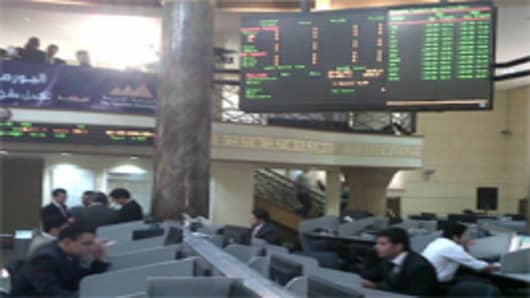Trade on Egypt’s stock market was suspended as stocks were surging on Monday but even so the market closed 7.6 percent higher, the first reaction to the announcement of Mohamed Mursi as Egypt’s new President. The surge places the index among the world’s best performers once again.
The Market Vectors Egypt ETF in the U.S., another way for foreign investors to win exposure to Egypt, also surged on Monday. It has lost over 20 percent in the three months leading up to the final round of the presidential contest and the latest election results have yet to be priced in.
Egypt’s benchmark index, the EGX30, had already gained 3.3 percent on Sunday, reflecting pre-announcement confidence in the outcome of the country’s first free presidential election.
The candidate of the Muslim Brotherhood’s political wing secured 52 percent of the vote trumping Ahmed Shafik, a former Commander in the Egyptian Air Force and Hosni Mubarak's last Prime Minister.
But experts have told CNBC that the historic step for Egypt may only be the start of a tug-of-war between the Muslim Brotherhood and the military council, which has overseen the transition thus far. The declaration comes in an environment where presidential powers are unclear, parliament is dissolved and a constitution has yet to be written.
Thousands of demonstrators in the symbolic Tahrir Square reacted with joy and celebrated late into the night, with fireworks lighting up the flag-waving crowds in downtown Cairo. The scenes were reminiscent of February 11, 2011, the day when Hosni Mubarak stepped down.
Plethora of Challenges
Mursi now faces the daunting task of forming a government that will tackle the plethora of challenges the Arab World’s most populous nation faces, ranging from reestablishing national security to fixing a broken economy.
The International Monetary Fund (IMF) expects economic growth this year to amount to just 1.5 percent, with near-term policy focus likely to be on securing external financing to tackle the budget deficit. It was not immediately clear how much more progress will be made on a $3.2 billion loan from the IMF.
The volatile political transition has also put pressure on foreign currency reserves, weakening the Egyptian Pound to the lowest level in seven years. Important foreign currency earners such as tourism and foreign direct investment (FDI) are still far off pre-revolution levels. Many analysts are convinced a devaluation is unavoidable.
Congratulatory messages poured in from around the world, with the United States describing it as a “milestone” and emphasizing it expected the new government to “ensure stability”, while Israel said it respected the outcome and hoped existing treaties would be upheld.
A more reserved message came from Gulf oil producers, who experts believe are concerned about a possible spillover of the Muslim Brotherhood’s victory on their political status quo. Dubai’s Police Chief, Dahi Khalfan, posted a tweet lamenting the outcome, saying it was “unfortunate”.
Meanwhile, in an interview with Iran’s semi-official Fars news agency, Mursi said he would seek a strategic balance in the region and was looking forward to expanding ties with Iran. The relationship has been far from cordial since the Iranian Revolution in 1979.
Yousef Gamal El-Din is CNBC's Middle East Correspondent and contributes to the channel’s flagship shows, as well as analysis for CNBC.com.
Stay in touch with him on Twitter at http://www.twitter.com/youseftv @youseftv


